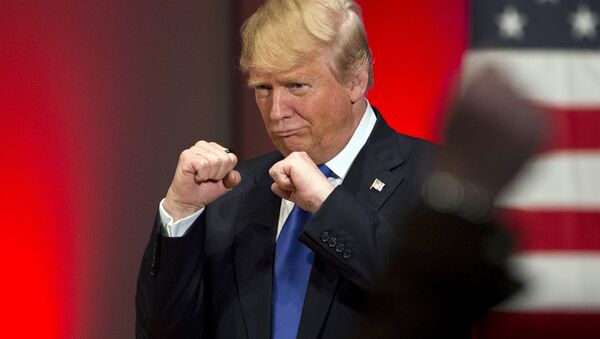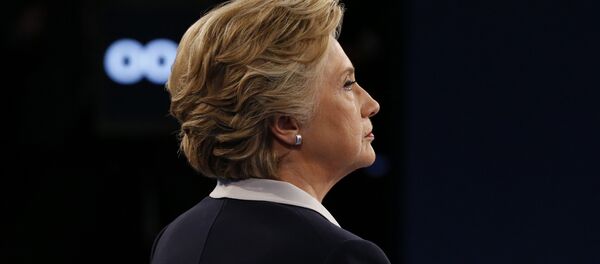The Democrats' "house of cards" is falling apart, while US President Donald Trump continues to gain ground, Vladimir Lepekhin, a member of Rossiya Segodnya's Zinoviev Club and general director of the EurAsEC Institute, writes in his op-ed for RIA Novosti.
"Trump is gradually taking over his opponents and step by step bringing the political situation in the US under his control," Lepekhin noted.
"No one in Muslim countries, the Vatican, Brussels, G-7, or Washington itself had managed to offer any alternative to Trump's new vision," he pointed out, adding that the US president's plan has already begun to turn into reality.
As an illustration, Qatar, which has long been Washington's close ally and sponsor of jihadists in Syria, suddenly has turned into a scapegoat being accused of sponsoring terrorism.
During my recent trip to the Middle East I stated that there can no longer be funding of Radical Ideology. Leaders pointed to Qatar — look!
— Donald J. Trump (@realDonaldTrump) 6 июня 2017 г.
"During my recent trip to the Middle East, I stated that there can no longer be funding of Radical Ideology. Leaders pointed to Qatar — look!" Trump tweeted Tuesday following the diplomatic demarche of the Gulf States, which severed their ties with Doha.
"The punishment of Qatar has marked the beginning of Washington's transition to a fundamentally new strategy in the Middle East region, designed, in particular, to break off criminal-lobbyist relations between American companies and their Saudi, Qatari and other partners, established by the State Department in the past 50 years," Lepekhin assumed.
It was earlier reported that Hillary Clinton's aides even went so far as to threaten Sajeeb Wazed Joy, son of Bangladeshi Prime Minister Sheikh Hasina, with an IRS audit while pressuring Dhaka to stop the investigation.
"If the Secretary of State used her position to intervene in an independent investigation by a sovereign government simply because of a personal and financial relationship stemming from the Clinton Foundation rather than the legitimate foreign policy interests of the United States, then that would be unacceptable," Grassley wrote in his letter to Secretary of State Rex Tillerson on June 1, 2017.
According to Lepekhin, these episodes, just like many others, show that Trump is strengthening his positions in the US Congress and Washington's power structures.
Although these developments cannot be yet called Trump's victory, one thing is obvious, Lepekhin stressed: the Democrats have nothing to set against the 45th US president, except for insinuations, sarcasm, lies and intrigues.
Meanwhile, there are three forces that are highly discontent with the US economic and political course shaped by the Democrats in the last decade.
"First, there are millions of American manufacturers, who do not fit in the Silicon Valley. Second, there are transnational bankers deprived of the opportunity to compete on par with the Federal Reserve, which enjoys a privileged position in the global financial system. And, third, there are sovereign countries which have grown tired of the pressure imposed by the American hegemon," Lepekhin stressed.
While the Trump administration is unlikely to take the problems of these countries to heart, the other two forces constitute a serious challenge to the status quo established by the Democrats.
Therefore, according to Lepekhin, Trump is not interested in promoting the Transatlantic Trade and Investment Partnership (TTIP) in Europe, or fighting with China in the South China Sea, or beefing up the US presence in Ukraine.
The scholar underscored that Trump is likely to focus on the Middle East and sea lanes connecting China with Europe.
"The team of Donald Trump intends to build a new card house of elite democracy, which, according to the US president and his supporters, will become a much more reliable construction than the previous one which was founded on 'American exceptionalism,'" Lepekhin wrote.
"The main ingredients of the new cementing mortar of this house should be pragmatism and moderate isolationism," the Russian scholar stressed.
That doesn't mean, however, that the US will abandon its economic control over Europe, Lepekhin noted, adding that the anti-Russian sanctions were, in essence, a tool to thwart the development of European manufacturers.
As for Russia, sooner or later Washington and Moscow will reach an understanding, the scholar believes. The contradictions between the two countries are not as deep as the antagonists of the Russo-American détente claim, Lepekhin highlighted.




